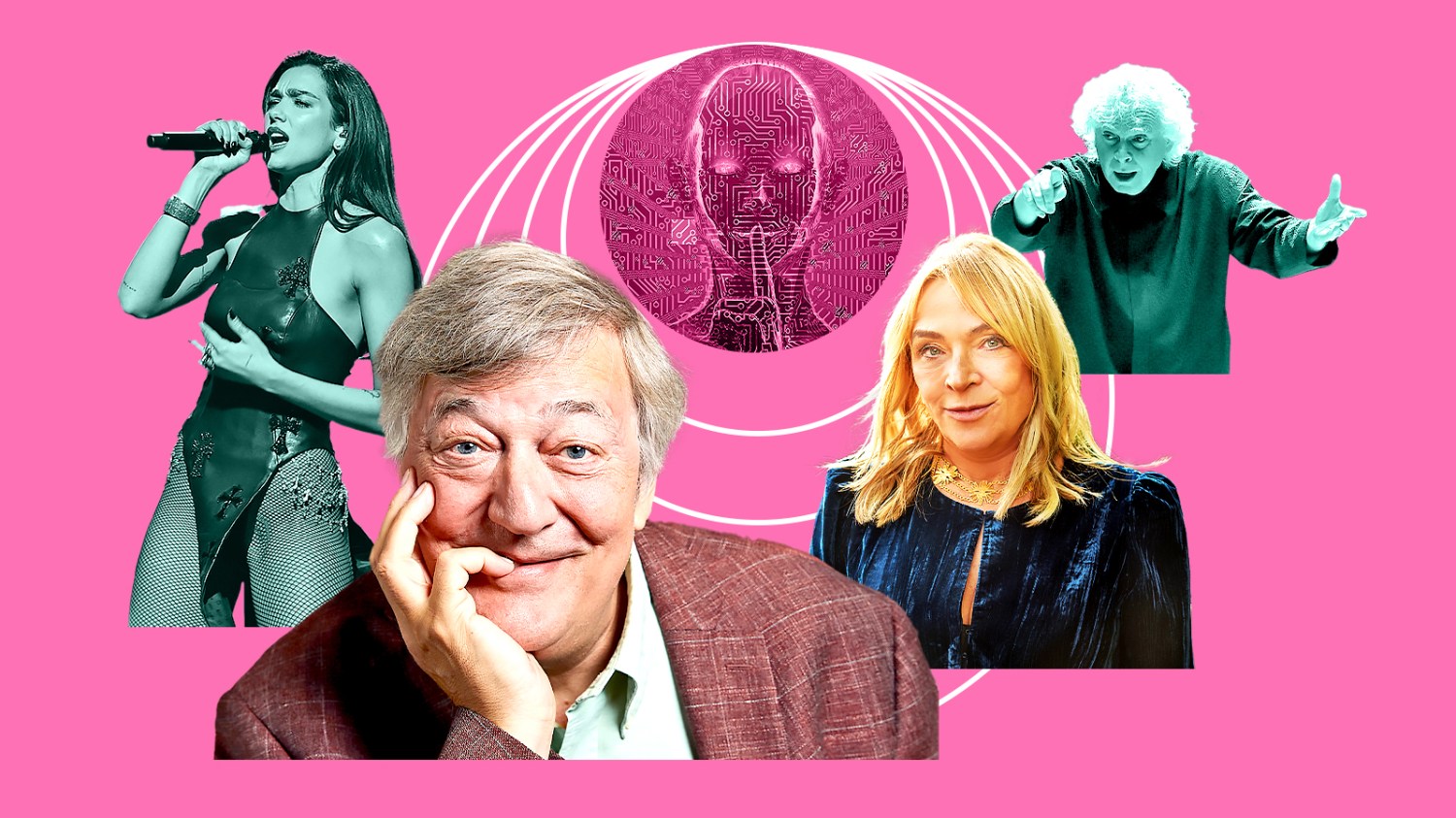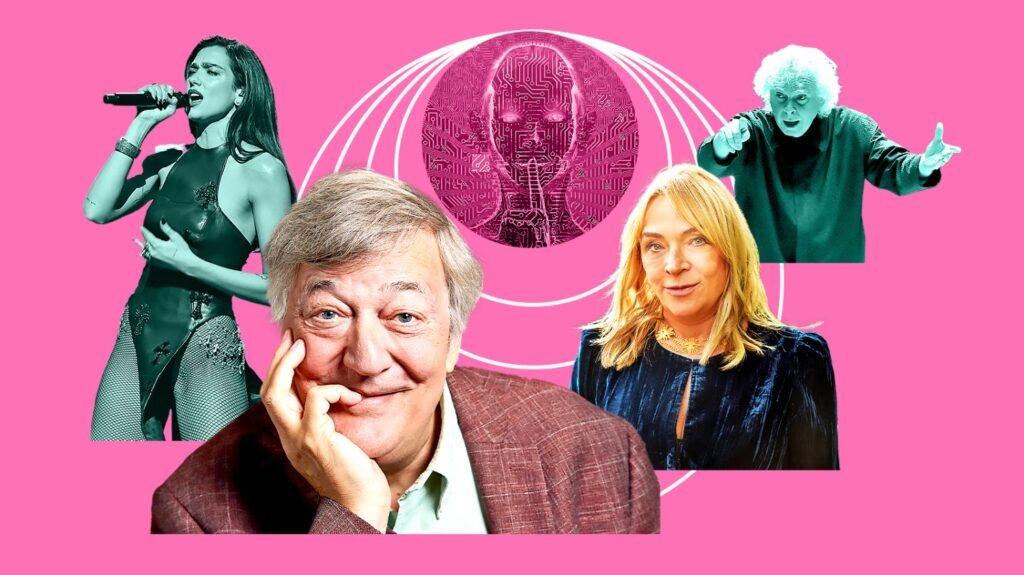

In a letter to The Times, signatories including Kate Bush, Sir Stephen Fry and Dua Lipa say changes to the law will allow big tech to raid the creative sectors
Andrew Lloyd Webber, Kate Bush, Sir Paul McCartney and Barbara Broccoli are among artists calling on ministers to prevent AI companies “stealing” copyright from Britain’s creative industries.
They were joined by Ed Sheeran, Sir Stephen Fry, Helen Fielding, Sir Simon Rattle, Dua Lipa, Sir Tom Stoppard, Sting and other leading creatives in opposing plans to change copyright laws.
In a letter to The Times, they warn that the proposals “represent a wholesale giveaway of rights and income from the UK creative sectors to big tech”.
The government is planning to change 300-year-old copyright laws to make it easier for AI companies to operate in the UK.

Kate Bush and Dua Lipa, below, are among the letter’s signatories
TREVOR LEIGHTON/FISH PEOPLE/AFP/GETTY IMAGES

HARRY DURRANT/GETTY IMAGES
A consultation, due to end on Tuesday, proposes that tech firms will be able to use copyrighted works to train their AI software without permission unless the owner opts out.
The artists say this will “smash a hole in the moral right of creators to present their work” and jeopardise a £126 billion industry that employs 2.4 million people in the UK.
They say in their letter that Britain’s creative industries “want to play their part in the AI revolution” but there is “no moral or economic argument for stealing our copyright. Taking it away will devastate the industry and steal the future of the next generation.”
The letter is also signed by Sir Elton John, Simon Le Bon, Sir Michael Morpurgo and Sir Kazuo Ishiguro.
Ministers have insisted that the changes are needed to foster the UK tech industry and drive economic growth.
But they are now facing a concerted campaign from the UK’s biggest stars and industries who oppose the move. Kate Bush said: “In the music of the future, will our voices go unheard?”
Peter Kyle, the technology secretary, has insisted that he is not taking sides between the tech and creative industries and the outcome of the consultation is not a “fait accompli”.
However, ministers are this week expected to remove or block a series of amendments approved in the House of Lords that would preserve copyright laws for the AI age.

Peter Kyle, the technology secretary, says he is not taking sides in the copyright battle
RICHARD LINCOLN/ALAMY
They were voted into the Data (Use and Access) Bill after a campaign led by Baroness Kidron, a film-maker and crossbench peer.
She has vowed to re-introduce the amendments in the Lords if they are removed in the Commons, engaging ministers in parliamentary “ping pong”.
Kidron said removing the amendments would be a “travesty”. She added: “The government has just shown its colours again. It wants to make the UK an AI hub of America and they’re sacrificing the creative industries to do it.”
The Sunday Times has reported that Lord Mandelson, the new ambassador in Washington, is mapping out a plan to offer the UK as America’s main foreign hub for AI and critical technologies.
The creative industries are urging people to write to their MPs to oppose the plans as part of a Make It Fair campaign. Owen Meredith, the chief executive of the News Media Association, said: “There will be no AI innovation without the high-quality content that is the essential fuel for AI models.
“We’re appealing to the great British public to get behind our ‘Make It Fair’ campaign and call on the government to guarantee creatives are able to secure proper financial reward from AI firms to ensure a sustainable future for both AI and the creative industries.”
Bush is also among 1,000 top musicians, including Annie Lennox, Damon Albarn and Jamiroquai, who released a silent album on Tuesday to highlight their concerns.
Titled Is This What We Want?, it features 12 tracks that are recordings of empty studios and venues which the artists believe symbolise the threat posed by new proposals. The track listing spells out the message: “The British government must not legalise music theft to benefit AI companies.”
The Clash, Yusuf Islam (Cat Stevens) and Tori Amos have also put their name to the album, which is distributed by Virgin Music. It features a range of composers, conductors, singers and producers as co-writers and includes a number of Oscar, Grammy and Brit Award winners.
The album will be available on Spotify and all royalties will go to the charity Help Musicians.
Dr Jo Twist, the chief executive of the British Phonographic Industry (BPI), said: “The UK’s gold-standard copyright framework is central to the global success of our creative industries. We understand AI’s potential to drive change including greater productivity or improvements to public services, but it is entirely possible to realise this without destroying our status as a creative superpower.”
Dan Conway, chief executive of the Publishers Association, said: “The message to government is clear: the great copyright heist cannot go unchallenged. Big Tech needs to pay for the creative and research content they hoover up to train AI, just as they pay for their electricity and other normal costs of running a legally compliant business.”
Sir Keir Starmer’s spokesman said the government recognised the “strength of feeling” from the creative industry. Ministers were not committed to an opt-out model, although this was their preferred option, but the spokesman suggested this could change. “The point of the consultation is to engage and to receive views, and we’ll obviously update at the other end of that,” he said.
“We want to strike a balance between a system that protects rights holders and their interests, but also allows AI innovators to invest into the UK and ensure that they’ve got appropriate access to data that supports investment into the sector.”